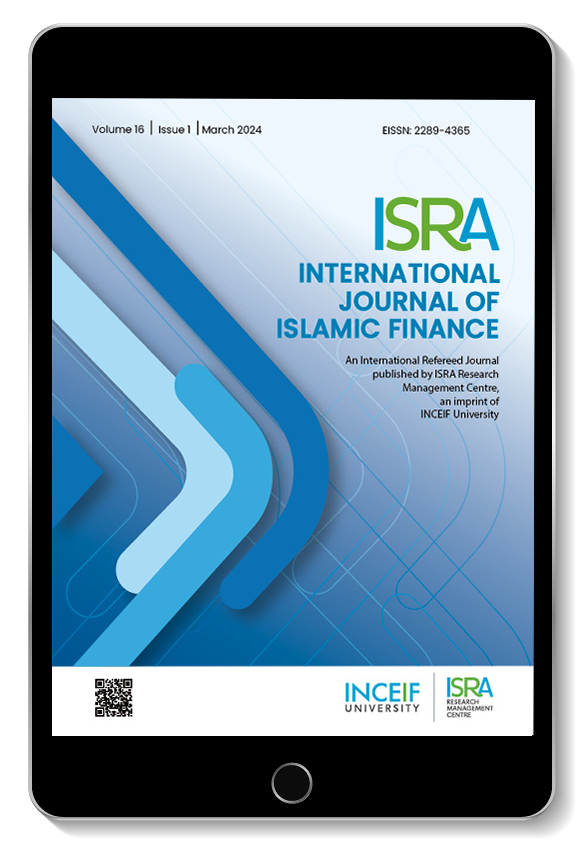Developing an Islamic Business Model: A Case for Agricultural Value Chain Finance in Agrobank, Malaysia
IF 1.4
Q2 BUSINESS, FINANCE
引用次数: 0
Abstract
Purpose — This study aims to analyse the development of an Islamic business model in the form of an agricultural value chain finance (AVCF) in Agrobank, Malaysia, from 2016 to 2020. Design/Methodology/Approach — This qualitative research adopted the case study approach, and data were collected by using the interview and document analysis methods. The interviews involved a member of the Shariah committee as well as the Chairperson of the Shariah department in Agrobank. The document analysis involved Agrobank’s annual report and its official website (www.agrobank.com.my). Findings — Findings indicate that Agrobank’s business model not only considers how to make profit but also how to practice and propagate Islamic values. Hence, Agrobank has modified the AVCF from trade finance to Sharīʿah finance contracts. This ensures that Agrobank’s business does not contradict Sharīʿah principles. However, mushārakah (participatory mode of finance) and muzāraʿah (temporary sharecropping) contracts, which are appropriately reputed, were not applied by Agrobank for the last five years. Findings show that qarḍ (loan), bayʿ al-ʿīnah (sale and buyback), bayʿ bi thaman ājil (deferred-payment sale), murābaḥah (sale with profit disclosure), tawarruq (two sale-and-purchase contracts, involving at least three parties, with the intention being to attain liquidity), and ijārah (lease) are contracts that positively affect businesses in Agrobank. These contracts provide flexibility for some people who are involved in the value chain. Originality/Value — This is an attempt to study the application of AVCF from an Islamic perspective in Agrobank. Research Limitations/Implications — Discussions in this paper are limited to AVCF as an Islamic business model in Agrobank. Practical Implications — This study encourages Islamic financial institutions (IFIs) to adopt the Islamic AVCF system through lessons learnt from Agrobank.发展伊斯兰商业模式:马来西亚农业银行农业价值链金融案例
目的-本研究旨在分析2016年至2020年马来西亚农业银行以农业价值链金融(AVCF)形式的伊斯兰商业模式的发展。
设计/方法/方法-本定性研究采用个案研究法,并通过访谈和文献分析方法收集数据。面谈涉及伊斯兰教法委员会的一名成员以及农业银行伊斯兰教法部门的主席。文件分析涉及农行年报及其官方网站(www.agrobank.com.my)。
调查结果-调查结果表明,农行的商业模式不仅考虑如何盈利,而且考虑如何实践和传播伊斯兰价值观。因此,农行将AVCF从贸易融资修改为沙迦融资合同。这确保了农行的业务不违背《教义》原则。然而,在过去的5年里,农行并没有采用口碑良好的mushārakah(参与式融资模式)和muzāra(临时分成)合同。研究结果显示,qarhar(贷款)、bay al- tah - nah(出售和回购)、bay al- tah - aman ājil(延期付款出售)、murābaḥah(披露利润的出售)、tawarruq(两份买卖合同,至少涉及三方,目的是获得流动性)和ijārah(租赁)是对农行业务产生积极影响的合同。这些合同为参与价值链的一些人提供了灵活性。
原创性/价值——这是从伊斯兰的角度研究AVCF在农行中的应用。
研究局限/影响-本文的讨论仅限于AVCF作为农行的伊斯兰商业模式。
实际意义-本研究鼓励伊斯兰金融机构(IFIs)通过农行的经验教训采用伊斯兰AVCF制度。
本文章由计算机程序翻译,如有差异,请以英文原文为准。
求助全文
约1分钟内获得全文
求助全文
来源期刊

ISRA International Journal of Islamic Finance
BUSINESS, FINANCE-
CiteScore
3.40
自引率
17.40%
发文量
18
审稿时长
20 weeks
期刊介绍:
It is the aspiration of the editorial committee that IJIF achieves the highest rank in quality and substance. It is thus our aim that the journal be carried in the Thompson Reuters’ ISI and Scopus databases. By ensuring high standards in articles published in Islamic finance we ensure that further innovation and research is carried out and promoted in the Islamic finance industry and academia. IJIF publishes 2 issues per annum.
 求助内容:
求助内容: 应助结果提醒方式:
应助结果提醒方式:


